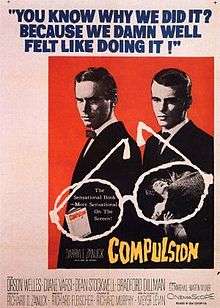Compulsion (1959 film)
| Compulsion | |
|---|---|
 Theatrical release poster | |
| Directed by | Richard Fleischer |
| Produced by | Richard D. Zanuck |
| Screenplay by | Richard Murphy |
| Based on |
Compulsion by Meyer Levin |
| Starring |
Orson Welles Diane Varsi Dean Stockwell Bradford Dillman |
| Music by | Lionel Newman |
| Cinematography | William C. Mellor |
| Edited by | William H. Reynolds |
| Distributed by | 20th Century Fox |
Release dates |
|
Running time |
103 minutes 99 minutes (FMC Library Print) |
| Country | United States |
| Language | English |
| Budget | $1,345,000[1] |
| Box office | $1.8 million (est. US/ Canada rentals)[2] |
Compulsion is a 1959 American crime drama film directed by Richard Fleischer. The film is based on the 1956 novel of the same name by Meyer Levin, which in turn was a fictionalized account of the Leopold and Loeb murder trial. It was the first film produced by Richard D. Zanuck.
Although the principal roles are played by Dean Stockwell and Bradford Dillman, top billing went to Orson Welles.
Plot
Close friends Artie Strauss and Judd Steiner (Bradford Dillman and Dean Stockwell) kill a boy on his way home from school in order to commit the "perfect crime". Strauss tries to cover it up, but they are caught when police find a key piece of evidence — Steiner's glasses, which he inadvertently leaves at the scene of the crime. Famed attorney Jonathan Wilk (based on Clarence Darrow and played by Orson Welles) takes their case, saving them from hanging by making an impassioned closing argument against capital punishment.[3]
Cast
- Orson Welles as Jonathan Wilk
- Diane Varsi as Ruth Evans
- Dean Stockwell as Judd Steiner
- Bradford Dillman as Artie Strauss
- E. G. Marshall as District Attorney Harold Horn
- Martin Milner as Sid Brooks
- Richard Anderson as Max Steiner
- Robert F. Simon as Police Lt. Johnson (as Robert Simon)
- Edward Binns as Tom Daly
- Robert Burton as Charles Straus
- Wilton Graff as Mr. Steiner
- Louise Lorimer as Strauss's mother
- Gavin MacLeod as Padua - Horn's Assistant
- Terry Becker as Angry Reporter (uncredited)
Reception
The film was entered into the 1959 Cannes Film Festival, where Dillman, Stockwell and Welles won the Best Actor Award.[4]
Accolades
It was nominated for the BAFTA best picture of the year. Richard Fleischer was nominated for best director by Directors Guild of America, and Richard Murphy was nominated for best screenplay by the Writers Guild of America.
The film is recognized by American Film Institute in these lists:
- 2008: AFI's 10 Top 10:
- Nominated Courtroom Drama Film[5]
See also
References
- ↑ Solomon, Aubrey. Twentieth Century Fox: A Corporate and Financial History (The Scarecrow Filmmakers Series). Lanham, Maryland: Scarecrow Press, 1989. ISBN 978-0-8108-4244-1. p252
- ↑ "1959: Probable Domestic Take", Variety, 6 January 1960 p 34
- ↑ Jake Hinkson (October 19, 2012). "Leopold and Loeb Still Fascinate 90 Years Later". criminalelement.com. Retrieved October 23, 2012.
- ↑ "Festival de Cannes: Compulsion". festival-cannes.com. Retrieved 2009-02-14.
- ↑ "AFI's 10 Top 10 Nominees" (PDF). Archived from the original on 2011-07-16. Retrieved 2016-08-19.
External links
| Wikiquote has quotations related to: Compulsion (1959 film) |
- Compulsion at the Internet Movie Database
- Compulsion at Rotten Tomatoes
- Compulsion at the TCM Movie Database
- Compulsion at AllMovie